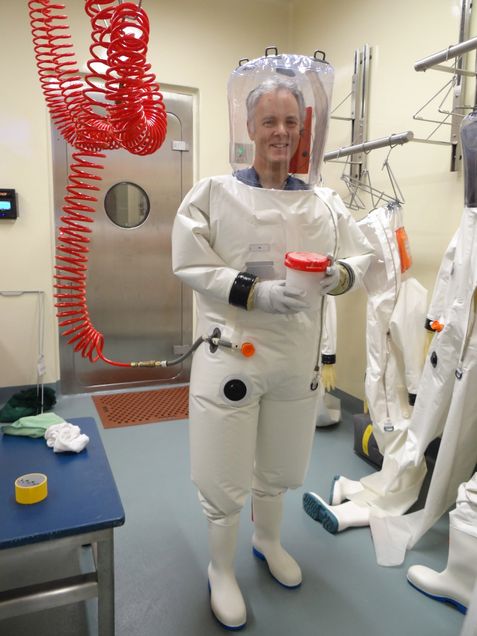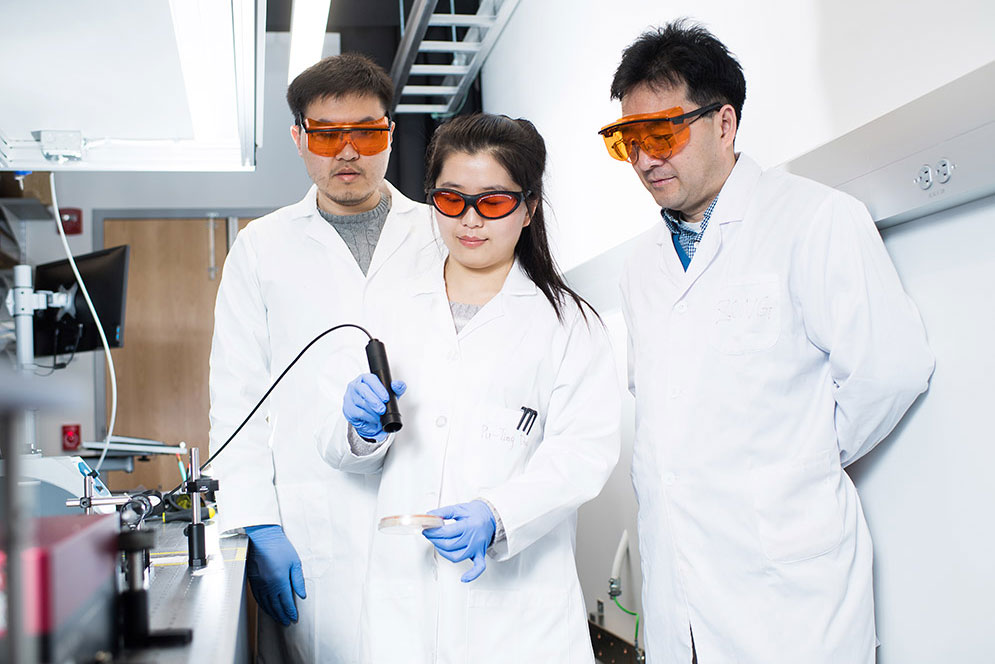News

Bionic Pancreas Passes Critical Science Hurdle
The Story, and the Science, behind BU’s COVID-19 Dashboard
BU scientists are “all hands on deck” supporting a one-of-a-kind system comprising custom software, real-time campus network modeling, contact tracing, and case cluster management
On August 17, Boston University began posting the results of its university-wide coronavirus testing program on a public-facing dashboard. Visitors to the site can now instantly see how many tests BU has performed in the past day or the past week, the total number of positive, negative, or invalid cases recorded, the overall percentage of positive cases at BU in comparison to the city of Boston and the commonwealth of Massachusetts, and more.

Live Coronavirus Research Gets Underway at BU’s NEIDL
Live Coronavirus Research Gets Underway at BU's NEIDL
Virologist Robert Davey will screen thousands of drugs for effectiveness against COVID-19 infection
Scientists at Boston University’s National Emerging Infectious Diseases Laboratories (NEIDL), led by microbiologist Robert Davey, this week started suiting up to conduct research on live samples of the novel coronavirus, the first team in Boston to start such work on the global pandemic.

Your Dentist, and Robot, Will See You Now
Your Dentist, and Robot, Will See You Now
Goldman Dental School embraces digital dentistry, with robots, 3-D, and more
The robotic arm with a drill for a finger hovers over the patient in the dental chair. The arm extends from a white machine, called Yomi, that’s as tall as Andrew Henry’s chest and as wide as his outstretched arms. Henry, a BU Henry M. Goldman School of Dental Medicine clinical associate of oral and maxillofacial surgery, positions Yomi’s drill near the patient’s mouth.

POV: World Series Umpires Did Not Have World-Class Performances This Year
POV: World Series Umpires Did Not Have World-Class Performances This Year
Players and fans deserve better behind home plate
The results are in. Less than a month after the Washington Nationals won the 2019 World Series, new data reveal that the Major League Baseball umpires collectively missed almost 9 percent of ball-strike calls in the tense seven-game series. In crucial count situations, such as three balls and two strikes, accuracy rates were even lower. Umpire team biases were also evident, as well as a flawed assignment system that placed seniority over merit.

Deep Sleep Gives Your Brain a Deep Clean
Deep Sleep Gives Your Brain a Deep Clean
Slow-wave activity during dreamless slumber helps wash out neural detritus
Why sleep has restorative—or damaging—effects on cognition and brain health has been an enduring mystery in biology. Researchers think cerebrospinal fluid (CSF) may flush toxic waste out, “cleaning” the brain and studies have shown that garbage clearance is hugely improved during sleep. They were not sure exactly how all this works, however, or why it should be so enhanced during sleep.

How Light Turns Ordinary Hydrogen Peroxide into a MRSA Treatment
How Light Turns Ordinary Hydrogen Peroxide into a MRSA Treatment
ENG researchers invent blue light therapy that kills MRSA without antibiotics
Boston University College of Engineering researchers who invented the technique say they have shown, experimentally, it can kill 99.9 percent of methicillin-resistant Staphylococcus aureus, known as MRSA. (Methicillin is a common antibiotic.) In people, MRSA, which often spreads very quickly, can cause skin and soft tissue infections as well as life-threatening sepsis.

BU Undergrad Researchers Find Microplastic Pollution in Seagrasses
BU Undergrad Researchers Find Microplastic Pollution in Seagrasses
Plastic pollution in the ocean has now invaded all marine food chains in the form of microplastics, found in seagrasses for the first time.
In the fall of 2017, Hayley Goss and Jacob Jaskiel were in Belize collecting seagrass blades from underwater meadows in the warm, shallow coastal waters of the western tropics. Goss and Jaskiel, student researchers at Boston University, weren’t thinking about plastic pollution in the ocean when they put on their snorkel gear and dived down to the seafloor, snipping away at the seagrasses—a species called T. testudinum—swaying in the underwater breeze of the currents. Instead, they were thinking about salad dressing.

BU-Led Study: CTE May Occur without Concussions
BU-Led Study: CTE May Occur without Concussions
Progressive brain disease could be caused by repetitive head injuries
A new BU-led study published Thursday in the journal Brain suggests that chronic traumatic encephalopathy (CTE) is caused by head injuries, not by concussions. The research explains why 20 percent of athletes who exhibited the early stages of the progressive brain illness postmortem never had a diagnosed concussion.
